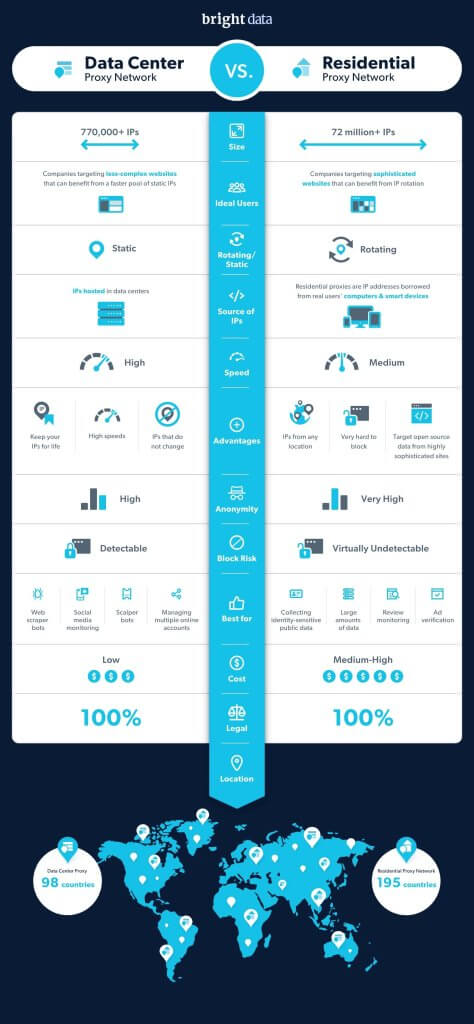In this post, we will cover:
- What proxies should you use for your business?
- What are Datacenter Proxies?
- What are Residential Proxies?
- Datacenter Vs. Residential Proxies
- FAQs
Listen to the short audio version of this article.
What proxies should you use for your business?
Here are a few real use cases for a variety of companies from different fields in order to better help you understand which proxy network may be best suited to your business’s needs:
Common Datacenter Proxy use cases
#1: Esports data analysis
This is a multi-sense big data-mining and analytics agency for esports, traditional sports, and entertainment. They provide comprehensive metrics for esports broadcasts and live streams. They use our Datacenter shared proxies in order to collect, research, process, and analyze data and statistics from:
- Live tournaments
- Real-time in-game events
- Players’/teams’ performance
- Spectator reactions and emotional contexts on social media networks
#2: Location-specific content verification
This is a news agency serving a number of key locations including:
- Indonesia
- Malaysia
- Cambodia
- Singapore
They use Data Center IPs in order to evaluate the consistency/suitability of the content being displayed to each individual local audience.
#3: eCommerce competitive market analysis
This is a small US-based company that uses Data Center IPs in order to collect information on in-market competitors as far as price and product inventory are concerned.
Common Residential Proxy use cases
#1: Social media marketing: User-generated insights
A design studio that also helps its customers with digital marketing. They use Residential Proxy networks in order to manage their clients’ social media accounts from different geolocations as well as boosting their data collection success rates on social media platforms. They typically collect social sentiment data from target audiences in order ‘to take the pulse’ on different industries as well as tracking their client’s competitor activity, including ad campaigns and organic post engagement (likes, shares, comments).
#2: Retail: Competitive market analysis
The client is a small company that has an online fashion boutique. They sell their items on their own website as well as on digital marketplaces such as Amazon and eBay. They use Residential Proxies from the United States and China in order to check similar competitor products online. They specifically want to see real-time price changes, customer reviews, and differences in product catalog variety so that they can adjust their shop/product offerings accordingly and increase market share.
#3: Business Intelligence (BI)
This company collects web data in order to enrich their Machine Learning (ML) tool for Venture Capital (VC) firms looking for new companies to invest in. They face challenges in scraping open source LinkedIn data on target business entities (typically, they experience lower than expected success rates). They now utilize Residential Proxies in order to significantly improve their success rates and provide their customers with quicker/more accurate investment recommendations.
What are Datacenter Proxies?
Datacenter Proxies are Internet Protocol (IP) addresses that are not associated with a home-based Internet Service Provider (ISP) (e.g., Verizon or AT&T). A batch of Datacenter IPs is typically assigned to one server through which data collection traffic can then be routed.
Datacenter Proxies pros and cons
Datacenter pros
- Shorter request journeys ensure quicker data retrieval times.
- These are one of the more cost-effective proxy options currently available on the market.
- These are static IPs that can provide businesses with a stable/consistent IP to operate from, for applications where this is advantageous
Datacenter cons
- Some Datacenter IPs come from a shared pool of proxies. Occasionally these proxies have been previously used, and this history may have a negative impact on data collection speed and/or determine whether or not a target site flags and blocks an IP address. Keep in mind though that users can always opt for dedicated IPs; the ‘shared’ version is merely a cheaper option that some businesses may decide to use.
- Datacenter IPs are more ‘detectable’ by target sites and are usually effective for domains with simpler blocking mechanisms.
What are Residential Proxies?
Residential Proxies are IPs that belong to real devices owned by people in different cities and countries across the world. Individuals opt their devices into a peer-to-peer network on which businesses can collect data from a user perspective while participants are compensated (with a premium membership of an app, for example).
Residential Proxies pros and cons
Residential pros
- This network enables companies to send an almost unlimited number of concurrent data requests
- Attaining higher success rates and more accurate information, offering a higher number of locations to choose from
- Being able to access more target sites with stricter blocking mechanisms by utilizing a peer so that the request is identified as an individual
Residential cons
- The main con is that Residential is a pricier option when compared with Datacenter IPs. But those costs come with justifiable benefits for specific business use cases.
Datacenter Vs. Residential Proxies
Here are the key points to consider when comparing these two options:
#1: ‘How costly are they to the end user?’
Datacenter proxies are the cheaper option as they tend to be lower value in terms of performance with the tougher target sites. Residential proxies, on the other hand, belong to real individual users who are compensated by the network for their participation, which explains why they are costlier.
#2: ‘How many locations are available?’
Datacenter Proxies are available in 98 different countries. Residential Proxies, on the other hand, are available in 195 different countries using 72+ million ethically-sourced IPs. They can target any country, city, carrier, and ASN (Autonomous System Number) in the world and are purpose-built for geolocation targeting as well as IP rotation.
#3: ‘How unique are the IPs?’
Datacenter IPs offer two options – ‘shared IPs’, and ‘dedicated IPs). The former is used together with other companies, while the latter is used exclusively by a specific user.
Residential offers IPs that are highly unique as each request is routed through a different real user device. They offer a wide variety of locations and can be rotated on-demand.
#4: ‘How effective are they in circumventing target site blockades?’
Aviv Besinsky, the Bright Data Product Manager for both Datacenter, and Residential Proxies, summarized the differences between these two networks in a very clear and concise way:
“You can use Datacenter proxies for almost anything, but you will just need to spend more Research and development (R&D) resources on building things such as ‘user emulation’, ‘CAPTCHA-solving’, ‘unblocking capabilities’ etc.. With Residential proxies, you will just require fewer resources.”
#5: ‘How fast are the IPs?’
Datacenter Proxies obtain information faster as the request is sent directly from the server to the target site. Whereas Residential Proxies need to typically send a request that has more ‘hops’ on its retrieval journey.
To clarify: ‘Hops’ are the number of routers that data packets need to travel through on their way to and from target web domains.
A quick chart to help easily summarize key Datacenter and Residential proxy differences
| Questions that businesses are asking: | Datacenter Proxies | Residential Proxies |
| How costly are they to the end user? | Are typically shared with other companies making them a cheaper option. | Are typically exclusively used by a given company and help save R&D costs leading to higher costs. |
| How many locations are available? | Available in 98 different countries but usually used to target one GEO at a time and not built to oscillate between locations. | Available in 195 different countries and purpose-built for GEO-targeting as well as IP rotation. |
| How unique are theIPs? | May be used by other industry actors, especially when leasing from a ‘shared IP pool’. | Are typically fresh/unique IPs assigned exclusively to the user. |
| How effective are they in circumventing target site blockades? | Effective for sites with simple architectures and minimal blocking mechanisms. | Useful for web domains with more complex site architectures and blocking mechanisms such as rate limitations or target data skewing |
| How fast are the IPs? | Faster output due to shorter data request journey. | A bit slower output due to a longer, peer-based request journey. |
The bottom line
When approaching this decision as a business, ask yourself how much of this process you wish to outsource and how much you wish to keep in-house? Do you have the resources to create technical supporting mechanisms as Datacenter Proxies may very well require, or do you prefer Residential Proxies that are lighter in terms of R&D? And lastly, what kind of budget do you have for the current project at hand?
FAQs
Feel free to check out our ‘Ultimate Guide To Proxy IP Types’, which goes into detail about the other proxy types beyond Datacenter and Residential. In short, these include:
Internet Service Provider (ISP) Proxies: These are real Residential IPs belonging to people that have opted into a global network enabling businesses to route requests through their devices. This means that you get all the advantages of using a Data Center (i.e., speed) while enjoying the benefits of appearing as an individual.
Mobile Proxies: These are 3G and 4G devices belonging to real individuals around the globe through which data requests are routed. They allow for precise carrier, and ASN, as well as country and city-specific targeting.
Web Unlocker: Is a tool that helps users scrape target sites using automated IP address rotation. It is capable of tackling site-specific browser user agents and cookies,
as well as handling all captcha-solving activites.
It depends on the provider you choose and whether or not they are committed to legitimate business practices. Bright Data’s Residential Proxy Network uses an Ethical SDK program that employs practices such as:
– Full peer consent
– Opt-in/out at any time
– Zero collection of end-user data
Datacenter proxies are blocked more often as many companies choose the ‘shared’ over the ‘exclusive’ pool of IPs. Many of these have been previously/currently used by other companies for similar data collection jobs, which may influence how target sites respond to them.



